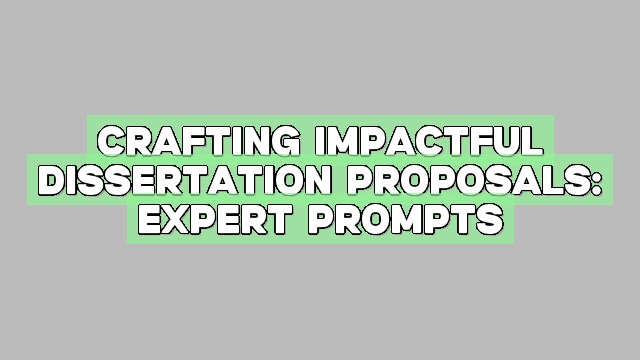As a graduate student, crafting a dissertation proposal is a crucial step towards achieving academic success and obtaining your degree. However, the process of developing a compelling proposal can be challenging, especially if you are unsure where to begin.
That’s where expert dissertation proposal prompts come in. By utilizing these prompts, you can guide your proposal writing process and ensure that your proposal is clear, concise, and impactful. In this article, we will provide a comprehensive guide to crafting impactful dissertation proposals using expert prompts.
Key Takeaways:
- Expert dissertation proposal prompts can help guide your proposal writing process.
- A well-crafted dissertation proposal sets the foundation for a successful dissertation.
- Key components of a dissertation proposal include the research question, methodology, literature review, and timeline.
- Expert prompts can help with developing a strong research question, selecting an appropriate methodology, conducting a thorough literature review, outlining a proposed timeline, and incorporating feedback and revisions.
Understanding the Dissertation Proposal
A dissertation proposal is an important preliminary step in the process of completing a dissertation. This document serves as a roadmap for the research that will be conducted and outlines the general scope of the study. The proposal must convince the committee that the research is worth pursuing and that the candidate has the necessary skills and knowledge to complete the project successfully.
The purpose of a dissertation proposal is to provide a clear and concise description of the planned research. It should explain why the research is important and how it contributes to the body of literature in the field. Additionally, it should provide a detailed plan of the research project, including the research question, methodology, and proposed timeline.
A dissertation proposal is typically structured in the following manner:
| Section | Description |
|---|---|
| Introduction | A brief background of the research problem and the primary objectives of the study. |
| Literature Review | A comprehensive review of the existing literature on the topic, including an explanation of any research gaps. |
| Research Methodology | A detailed description of the research methodology, including the data collection methods and analysis techniques. |
| Proposed Timeline | A proposed timeline for completing the research project. |
| References | A list of all sources cited in the proposal. |
The dissertation proposal is a crucial component of the overall dissertation process. It is an opportunity for the candidate to demonstrate their knowledge of the field and their ability to design and execute a research project. A well-crafted proposal can set the foundation for a successful dissertation and help secure approval from academic advisors and committees.
Importance of Crafting an Impactful Dissertation Proposal
Crafting an impactful dissertation proposal is a crucial first step in the research process. It sets the foundation for the entire dissertation, serves as a guide for the research, and helps secure approval from academic advisors and committees. Using expert prompts to create a well-crafted proposal is essential for achieving success in academic writing.
An impactful dissertation proposal showcases the researcher’s ability to think critically, formulate a clear research question, and demonstrate familiarity with the relevant literature in the field. Such a proposal should also provide a roadmap for the research project, outlining the research methodology, data analysis techniques, and a realistic timeline. Expert prompts can guide researchers in each of these areas, ensuring that their proposal is of the highest caliber.
Expert Dissertation Proposal Prompts
When it comes to crafting a dissertation proposal, it’s essential to have a set of guidelines that can help you structure your work in the most effective way possible. Expert prompts are one of the best ways to go about this, as they provide much-needed direction and focus that can help you create an impactful proposal that stands out.
Here are some expert dissertation proposal prompts:
| Prompt | Description |
|---|---|
| Develop an original research question | Develop an original and relevant research question that aligns with your research objectives and sets the stage for your dissertation. |
| Select an appropriate methodology | Explore different research methodologies and choose the one that best aligns with your research objectives and data collection methods. |
| Conduct a thorough literature review | Identify relevant sources, synthesize existing research, and identify research gaps that can inform your research question and methodology. |
| Outline a realistic timeline | Create a well-structured timeline that breaks down your research project into manageable tasks with achievable deadlines. |
These prompts can help you stay on track and ensure that your proposal covers all the essential components required for approval. By applying these prompts, you’ll be able to submit a compelling proposal that stands out and sets the foundation for a successful dissertation.
Crafting an Effective Research Question
The research question is the foundation of any successful dissertation proposal, and it’s critical to craft one that is specific, relevant, and aligned with your research objectives. Here are some expert prompts to help you create an effective research question:
- Start with a general idea: Think about the big picture of your research, and develop an initial topic of interest. This could be a broad theme or phenomenon that you want to explore in more depth.
- Narrow down your focus: Once you have a general idea, narrow it down to a specific research question that you can realistically address within the scope of your dissertation. Consider what aspect of the topic you find most interesting or important, and what research gap you want to fill.
- Ensure relevance: Make sure your research question is relevant to your field of study. Consider the existing literature on the topic, and how your research question will contribute to the knowledge base.
- Make it measurable: Your research question should be specific enough to allow for measurable outcomes. This means defining key variables or concepts that you will explore in your research and identifying how you will measure them.
- Align with research objectives: Your research question should align with the overall objectives of your research project. Consider the broader research goals you hope to achieve, and ensure that your research question is in line with these objectives.
- Consider feasibility: Finally, make sure that your research question is feasible given the time, resources, and data available to you. Consider any potential challenges or limitations that may impact your ability to address your research question effectively.
By following these expert prompts, you can develop a research question that is well-crafted and aligned with your research objectives, setting the foundation for a successful dissertation proposal.
Selecting an Appropriate Methodology
One of the most critical aspects of a dissertation proposal is selecting an appropriate methodology that aligns with your research objectives. The methodology you choose determines how you collect and analyze your data, and it affects the overall credibility and reliability of your study. Therefore, it’s crucial to consider multiple factors and make an informed decision when selecting a research methodology.
Expert Prompts:
| Prompt | Description |
|---|---|
| Identify research goals | Define and clarify your research objectives and goals. By understanding your research goals, you can choose a methodology that aligns with your research questions and meets your needs. |
| Research existing methodologies | Research various research methodologies used in your field. Consider the strengths and weaknesses of each methodology and how it fits your research objectives. |
| Consult with your advisor | Collaborate with your advisor or mentor to determine the most appropriate methodology for your research. By seeking their input, you can benefit from their experience and expertise. |
| Consider ethical implications | Consider the ethical implications of your research methodology. Ensure that your selected methodology adheres to ethical guidelines and does not harm any individuals or groups. |
Ultimately, the appropriate methodology for your dissertation proposal depends on your research question, data collection methods, and field of study. Selecting the right methodology can enhance the quality and accuracy of your research, contributing to a compelling and effective proposal.
Conducting a Thorough Literature Review
A literature review is a crucial component of a dissertation proposal, providing a comprehensive assessment of existing research related to the research question. A thorough literature review serves as the foundation for the proposed research, helping to identify knowledge gaps and establish the significance of the research question.
To conduct a thorough literature review, it is important to select relevant sources and synthesize the information in a clear and organized manner. Expert prompts can help guide this process, such as:
- Identify key authors and publications related to the research question
- Evaluate the quality and credibility of the sources
- Synthesize the information in a clear and organized manner
- Identify knowledge gaps and areas for further research
Organizing the literature review section effectively is also important. Consider grouping sources based on themes or subtopics related to the research question. Use headings and subheadings when necessary to provide structure and clarity.
A thorough literature review is essential for a compelling dissertation proposal. Incorporating expert prompts and organizational strategies can help ensure the literature review section is comprehensive, well-researched, and well-structured.
Outlining the Proposed Timeline
One key component of a dissertation proposal is outlining a proposed timeline that effectively breaks down the research project into manageable tasks and sets achievable deadlines. Crafting a realistic timeline is essential to the success of the overall dissertation process.
To begin, consider the scope of the research project and break it down into specific tasks that are both relevant to the research question and feasible within the given time frame. It is important to allow for some flexibility in the timeline, as unexpected challenges can arise throughout the process.
Expert prompts can assist in outlining a proposed timeline, such as:
“Break down the research project into specific tasks and assign realistic deadlines to each one.”
“Consider potential challenges or setbacks that could arise and allow for extra time in the timeline.”
It is also important to regularly review and revise the proposed timeline as necessary. Seek feedback from academic advisors, peers, or colleagues to ensure the proposed timeline is reasonable and achievable.
Overall, crafting a well-structured and realistic timeline is crucial to the success of a dissertation proposal and the overall research process.
Incorporating Feedback and Revisions
The process of creating an impactful dissertation proposal is iterative and involves seeking feedback and making revisions. Incorporating feedback allows you to refine your ideas, improve the quality of your proposal, and respond to the expectations of your academic advisor or committee. Here are some expert prompts to guide you through this phase of the process:
| Expert Prompt | Description |
|---|---|
| Schedule a meeting with your academic advisor | Arrange a face-to-face meeting with your academic advisor to discuss the feedback you received and how you can address it. Prepare a list of questions to ask and a plan of action for implementing the feedback. |
| Join a peer review group | Participate in a peer review group to get feedback from other students who are working on similar topics. Exchange proposals with peers and provide constructive feedback to help them improve their work. |
| Revise your proposal based on feedback | Use the feedback you receive to revise your proposal. Make sure you address all the comments and suggestions you received, and provide a clear rationale for the changes you made. |
It is important to manage feedback effectively and integrate it into your proposal in a timely manner. Here are some tips for doing so:
- Keep a record of the feedback you receive and the changes you make to your proposal
- Don’t be defensive or dismissive of feedback; instead, try to understand the perspectives of your advisors and peers
- Set priorities for addressing feedback and focus on the most critical issues first
- Allow time for additional revisions and feedback cycles, if necessary
Incorporating feedback and revising your proposal may take several rounds of review and revision. However, the effort you put into this process will help you create an impactful proposal that sets the foundation for a successful dissertation.
Conclusion
In conclusion, crafting impactful dissertation proposals is a crucial step towards achieving success in academia. With the help of expert prompts and guidance, readers can navigate the proposal writing process with ease and confidence. By ensuring that proposals contain a clear research question, appropriate methodology, thorough literature review, and realistic timeline, students can set a sturdy foundation for their research project and secure approval from academic advisors and committees.
It’s important to remember that the proposal writing process is iterative, and incorporating feedback and revisions is fundamental to producing a high-quality proposal. By seeking feedback from advisors, peers, or colleagues and implementing revisions based on the received feedback, students can refine and improve their proposals. With determination, dedication, and the right tools, students can excel in their academic journey and achieve their research goals.
Apply the Prompts and Excel in Crafting Impactful Dissertation Proposals
We encourage readers to apply the expert prompts and guidance provided in this article throughout their dissertation proposal writing process. Whether it’s formulating a clear research question, selecting an appropriate methodology, conducting a thorough literature review, outlining the proposed timeline, or incorporating feedback and revisions, the prompts offer a comprehensive framework that can help students create impactful proposals that impress advisors and committees.
Remember, crafting impactful dissertation proposals is not only essential for academic success but can also shape future research and career opportunities. We hope that this article has been helpful and motivational to readers in their academic journey. Happy proposal writing!
FAQ
Q: What is the purpose of a dissertation proposal?
A: A dissertation proposal outlines the research topic, objectives, methodology, and timeline for a doctoral research project. It serves as a roadmap for the dissertation and helps gain approval from academic advisors and committees.
Q: What should be included in a dissertation proposal?
A: A comprehensive dissertation proposal should include a research question, literature review, methodology, and timeline. It should also demonstrate the significance and feasibility of the research project.
Q: How can expert prompts help in crafting an impactful dissertation proposal?
A: Expert prompts provide guidance and prompts for different aspects of the proposal writing process. They assist in formulating a clear research question, selecting an appropriate methodology, conducting a thorough literature review, and outlining a realistic timeline.
Q: Why is it important to have a well-crafted research question?
A: A well-crafted research question sets the foundation for a successful dissertation proposal. It helps define the scope of the research, guides data collection and analysis, and contributes to the overall coherence and clarity of the proposal.
Q: How can I select an appropriate methodology for my dissertation proposal?
A: Expert prompts can assist in selecting an appropriate methodology by considering research objectives, data collection methods, and disciplinary norms. They encourage critical thinking and provide guidance on choosing the most suitable methodology for the research project.
Q: What is the role of a literature review in a dissertation proposal?
A: A thorough literature review demonstrates the existing knowledge and research gaps related to the research topic. It helps situate the research within the broader academic context and justifies its significance. Expert prompts can guide readers in selecting relevant sources and structuring the literature review effectively.
Q: Why is outlining a proposed timeline important in a dissertation proposal?
A: An outlined timeline helps in organizing and managing the research project effectively. It ensures that the research tasks are completed within a reasonable timeframe and allows for potential challenges and revisions. Expert prompts assist in breaking down the project into manageable tasks and setting achievable deadlines.
Q: How can I incorporate feedback and revisions into my dissertation proposal?
A: Incorporating feedback and implementing effective revisions is a crucial part of the dissertation proposal process. Expert prompts encourage seeking feedback from advisors and peers and provide guidance on incorporating revisions based on the received feedback. They offer tips for managing and integrating feedback efficiently.
Q: What is the iterative nature of the dissertation proposal process?
A: The dissertation proposal process is iterative, meaning that it involves multiple rounds of feedback and revisions. It is expected that the proposal will evolve and improve over time based on feedback and further research. Expert prompts support this iterative process by guiding readers in implementing effective revisions.









